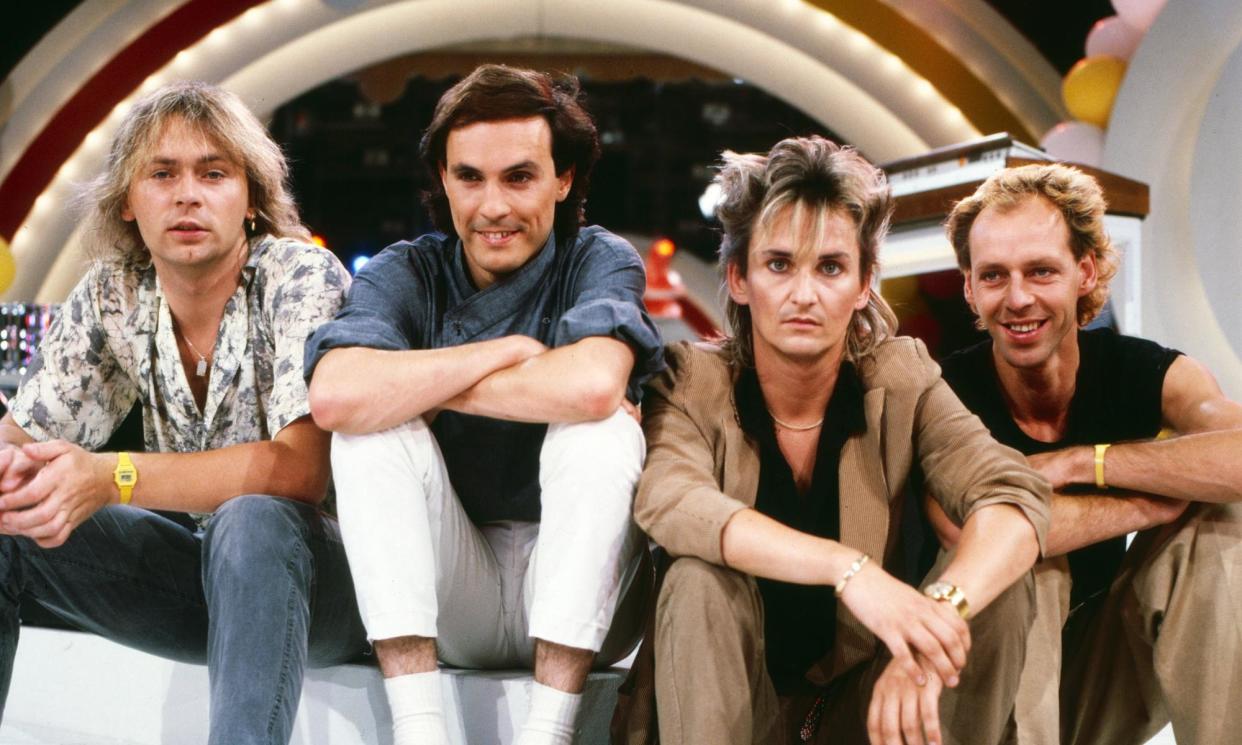‘I didn’t engage with the Bowie song’: Peter Schilling on Major Tom, the unofficial anthem of the Euros

If you are planning to brush up on your German ahead of tonight’s opener of the European Championships, one umlaut-heavy phrase could come in handy: Völlig losgelöst.
Meaning “completely untethered”, these two words form the chorus of Peter Schilling’s Major Tom, a German new wave song that first climbed to the top of charts around the world in 1983 but stands good chances of becoming the unofficial anthem of the football tournament summer 41 years later.
“I’m used to overnight successes,” Schilling, now 68, told the Guardian. “But in the 80s overnight meant a momentum would grow behind a song over the course of a few weeks. Now it really happens overnight.”
A week after the song featured as the soundtrack to the Adidas social media ad that launched Germany’s tournament kit in mid-March, fans launched a petition to make it the national team’s Torhymne, the jingle played inside the stadium after a goal is scored.
By the end of that month, Major Tom rang through Frankfurt’s Waldstadion after Germany’s opener in a friendly against the Netherlands. It was the song that fans chanted after storming the pitch the day Xabi Alonso’s Bayer Leverkusen won the German league title in April. This month the German FA official made it its goal anthem.
Over the next four weeks, it’s likely that Schilling’s earworm could become to Euro 2024 what Gala’s Freed from Desire was to Euro 2016 and Neil Diamond’s Sweet Caroline was to Euro 2020: a song that is chanted from the terraces by fans of all nationalities, in sweet defiance of whatever song Uefa has deemed the competition’s official anthem.
“It’s a great honour,” Schilling said. “Especially because all the current hype around Major Tom wasn’t conceived of in a caffeine-fuelled marketing meeting, but only by the fans themselves.”
It would not be the first renaissance of a song that Schilling originally recorded entirely in his one-bedroom apartment. After reaching the top of the charts in Germany, Austria, Switzerland, Canada and Bolivia in 1983, Major Tom underwent its first revival in the 2010s as an audio shorthand for film directors keen to evoke the sheen of 1980s cool.
Alongside Nena’s 99 Luftballons, it is the song most instantly and internationally recognisable as the sound of the post-punk-meets-schlager neue Deutsche welle genre. It has featured in the fourth season of Breaking Bad, in the opening credit of TV series Deutschland 83 and 2017’s Charlize Theron-starring Atomic Blonde.
Its suitability as a tournament song seems obvious in retrospect, and not just because Schilling used to be a decent left-winger as a teenager and nearly signed a pre-contract agreement with German club VfB Stuttgart before focusing on a career in music.
Lyrically and musically, this is a song about nervous anticipation of a big event – and the sweet release that follows. To the sound of a restrained electric guitar, the verse describes scientists preparing the launch of a space-craft: “The countdown starts / Watching in a trance, the crew is certain / Nothing left to chance, all is working.”
The shift from verse to chorus – reversing the groove, switching to double-time, climbing chords – has a liberating effect: as the spaceship hauls itself into the atmosphere, “completely untethered”, planet Earth and all its troubles shrink into the distance. “The resolution effect you get through the music really supports the lyrics and has been copied a lot,” Schilling recalled proudly.
Major Tom’s escapist fantasy has resonated in Germany, encapsulating a yearning for the sporting event to provide a moment of weightlessness after the heavy debates over Ukraine, climate measures and immigration that have dragged the country down in recent years.
“For years, the national team wasn’t in a great state,” Schilling said. “There was a deep gulf between the fans on the one side, and the officials at the football association on the other. There’s something about the timing of the song that hits the spot.”
Lyrically, Major Tom is a twin to David Bowie’s Space Oddity, and some may say more than that: in both songs, there is some kind of malfunction on the spacecraft that leads to a fictional astronaut called Major Tom drifting off into the starlit void. “Tell my wife I love her very much she knows,” Bowie wrote in 1969, “Give my wife my love,” says Schilling’s song in Canadian songwriter David Lodge’s English translation, released 14 years later.
Schilling conceded Bowie’s psychedelic folk ballad was “without a doubt” in his head when he wrote Major Tom. “Of course the template was there,” he said, adding: “But once you decide to tell a song with an astronaut it’s quite difficult to tell a different kind of story.”
The key inspiration for his song wasn’t Bowie’s song but Stanley Kubrick’s Space Odyssey, which Schilling saw at the cinema in the early 70s, and “left as a different person … Space was still an utter mystery to us then – until Kubrick came along, there were no images of it. To be honest, I didn’t engage with the Bowie song much at the time.”
Arguably, the lyrics of Major Tom are even more melancholy than those of A Space Oddity, which makes its revival as a terrace anthem even more intriguing. In Bowie’s song, Major Tom appears to be cut off from civilisation by accident (“Your circuit’s dead, there’s something wrong”), while in Schilling’s version, the astronaut seems to voyage into nothingness intentionally: “No one understands, but Major Tom sees / ‘Now the light commands, this is my home / I’m coming home.’” Is the unofficial anthem of Euro 2024 a song about a suicide mission?
“If what the fictional Major Tom did was planned in advance, then it would have been a suicide mission,” Schilling reflected. “But sometimes things take place in the moment.”

 Yahoo News
Yahoo News 
